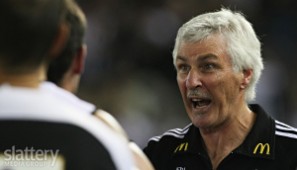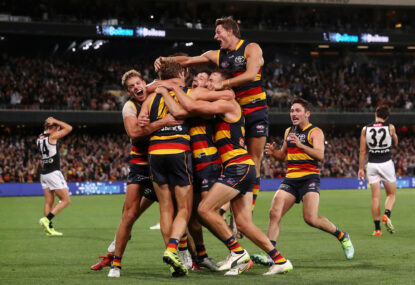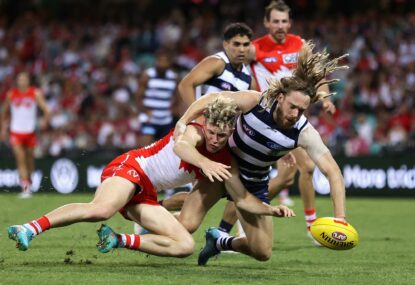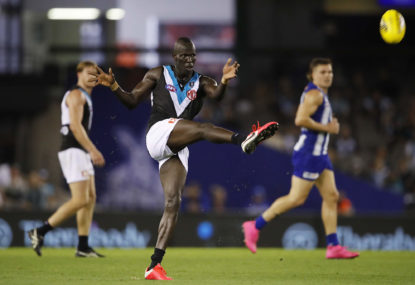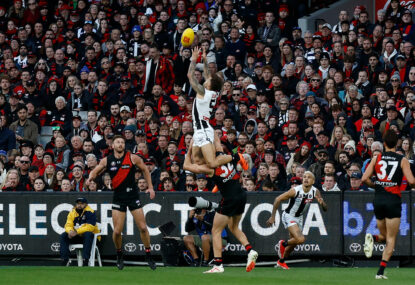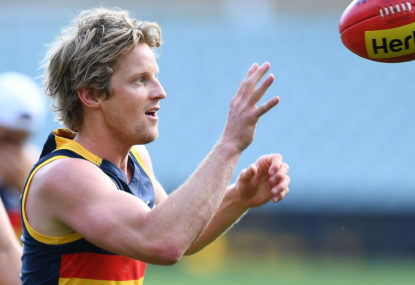It has been said that the modern era is the hardest era to be a senior AFL coach, with the constant media scrutiny, the unrivalled pressure from the board, fans and media, and the now 24/7 aspect of the job these days.
In the last two years, two clubs, in Carlton and Melbourne, have removed coaches in the middle of their contract.
For Carlton, it unseated Brett Ratten in the middle of his contract to secure the services of Mick Malthouse. Melbourne recently sacked Mark Neeld, and has been replaced for the moment by Neil Craig as a caretaker coach, but it is no secret that the Demons would love to be coached by Paul Roos.
This has come by an interesting new addition to coaching advertisements. While clubs have sometimes gone for coaches with previous senior coaching experience, the addition of “premiership coach” by Carlton and Melbourne to their criteria for senior coach.
It’s interesting to compare the two clubs and where they are at to Port Adelaide, who replaced Primus after he stepped down as coach from the club and was replaced by Ken Hinkley, after a short coaching stint by Garry Hocking.
Carlton appointed Mick Malthouse after Brett Ratten could only lead the Blues to a ninth place finish. Ratten had been much maligned by the Carlton fan base, and these elements of the Carlton fan base called for the head of their coach after a disappointing season, in which Carlton aimed to push for top four.
Malthouse’s availability for the senior position, after being ousted at Collingwood by Nathan Buckley also played a factor in Carlton’s decision to terminate Ratten’s contract due to the availability of a “premiership coach” with serious senior experience across several clubs.
The football community undoubtedly respects Malthouse, and many Carlton fans believed that Malthouse’s appointment would be the silver bullet to Carlton’s issues and perhaps it would have a crack at the premiership after a gap of almost 20 years for the historically successful club.
While Malthouse deserves more time to work with the club, and fans calling for his ousting are far too hasty to pass judgment, it is clear that the Malthouse experiment has not gone to plan.
It is clear that some of Malthouse’s coaching decisions have been questionable, such as the continued usage of the undersized Bootsma and the lack of opportunities given to players like Bell, Duigan and Laidler after they stepped up well last year due to injuries to Carlton players.
Duigan’s exclusion from the side is particularly surprising given that he was considered a large part of the leadership group at the start of this season.
Over at Melbourne, a club that seems to be stuck in a perpetual loop of rebuilding has had 6 coaches over the last six years, and will look to add a seventh coach with what it hopes will be able to secure the services of former Swans coach Paul Roos.
The hopes are that Roos will be able to build the club, which none of the coaches before him have been able to do. The most interesting point is that the expectations on Roos, if he signs up, are completely the opposite of the expectations placed on Malthouse at Carlton.
While Carlton hope that Malthouse will be able to lead them onto a premiership, no one at the Demons are thinking that, and if Roos manages to lead them to be more competitive in general it’s already worth it.
Compare these two situations with what happened at Port Adelaide, after a shocking season last year. Port coach Matthew Primus stepped down and at the end of the season they appointed unknown coach Ken Hinkely.
In the off-season, Hinkley instilled a fitness regime at Port that looked to build up stamina of the players. At the start of the season, much to everyone’s surprise, Port won it’s first five games.
While none of the teams it had beaten were of note, the pace at which Port had set at the start of the season was truly a credit to Hinkley, his fitness regime and the recruiters who brought in Ollie Wines, Jake Neade and Chad Wingard as well as rejuvenating the careers of Justin Westoff, Jay Shulz, Hamish Hartlett and Angus Monfries.
While Port fell off the pace in the middle of the season, they still managed to claim major scalps, beating both the reigning premiers Sydney and Collingwood in successive weeks.
It’s clear that if Port are able to maintain their program there shouldn’t be any reason why the team cannot improve when they get a few more seasons into their younger players.
The idea behind selecting a “premiership coach” is that a coach who has led a team to a Premiership is capable of doing so again, potentially with another club, at least this seems to be the motivation behind Melbourne and Carlton’s decision to search for one.
However, the reality is that before these coaches had won a premiership, they were also not premiership coaches. A brief look at the past nine years shows that since the Lion’s reign of dominance only two “premiership coaches” had in fact been premiership coaches before they won.
The list includes some of the fantastic coaches such as, John Longmire, Alastair Clarkson, Chris Scott, Paul Roos, and John Worsefold. The only two coaches to have been premiership coaches before a premiership win has been Mick Malthouse and Mark “Bomber” Thompson who won two premierships in the last nine years after a highly successful stint with undoubtedly the best team of the last decade at Geelong.
The issue here is that until you win a premiership, you aren’t a premiership coach, the reality is successful coaches are coaches that are discovered and build a team not poached.






























































































